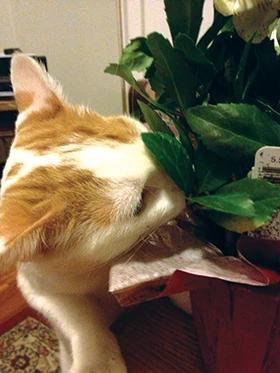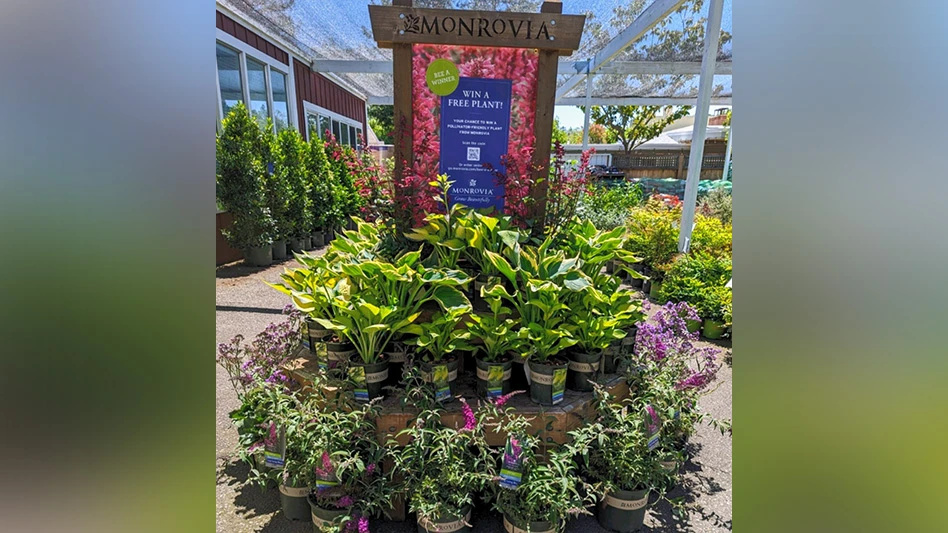
 Ask almost any pet owner if they own a houseplant, and many will tell you that even though they would like to, they can’t have one because houseplants are toxic for their pets. These owners could be your next customers if they only knew which plants are safe for their pets.
Ask almost any pet owner if they own a houseplant, and many will tell you that even though they would like to, they can’t have one because houseplants are toxic for their pets. These owners could be your next customers if they only knew which plants are safe for their pets.
Houseplants in particular get a bad reputation as being non-pet friendly. It can be, however, more a matter of the owner’s lack of knowledge as opposed to the toxicity of the plants that keep people from buying houseplants.
Plants and pets – it’s a delicate balance
In order to merchandise plants to people with pets you must understand the relationship between the human, the pet, and the plant. The human chooses to have both pets and plants because they are both pleasing in some way. When it comes down to making a decision between a plant and a pet, depending on the individual, the pet is likely going to stay, and the plant is likely going to go. It’s a hard sell, especially when there is a deeply rooted idea of “all houseplants are toxic plants” in your customers’ heads. Customers will eventually try to have both plants and pets, and when the pet either eats the plant and gets sick or decides it’s a plaything, the customer will ditch the plant, curse the place they bought it from and keep the pet.
The most important thing you can do for these particular pet owners is educate them about how their pet sees plants. Chances are they love the pet, but don’t know exactly what makes them tick (besides ticks).
Most of the time pets will only target and go after plants if they’re bored and need something to play with. Plants with long, pendulous leaves, such as Pony Tail Palm, will become nothing but an object to be batted around to a restless cat. As much as the customer doesn’t want to hear the truth, sometimes the simple solution of providing the pet with new or different toys will decrease the possibility of the bored cat batting the plant to pieces.
What if they’re not bored?
Pets, even when they’re not bored, have simple instincts that they carry with them from long ago when they lived outside and had to rely on the land for nourishment. Dogs and cats are naturally carnivores but are used to getting a certain level of partially digested greenery from the stomachs of the animals they kill and consume, which is thought to act as roughage to aid digestion. Although animals don’t seek out greenery in the wild, they eat it involuntarily in this way. Pet foods are commonly packed with crude proteins and fillers, and lack the greens and nutrients that occur naturally in plants.
Some breeds of dogs and certain cats with feral ancestry are more prone to chew and actually eat houseplants. They lack the naturally occurring stomach greenery and seek it out in other forms - houseplants.
In these circumstances when the animals actually chew, swallow, and get sick, plant selection is going to be a little more limited. Open your customers’ eyes to the possibility of growing houseplants in terrariums, which are versatile and safe for households with pets.
The plus side of this is that there is no possible way for the pet to access the plant material and ingest any amount of plant, poisonous or not. This is also a fantastic way to work up some tack on sales such as the terrarium, soil, charcoal, and perhaps miniature gardening supplies.
Pica – a houseplant lover’s worst enemy
Pets, much like people, have personalities and moods. On the same token pets can develop mental disorders that are borderline compulsive. Pica is a disorder that effects domesticated animals and mimics Obsessive Compulsive Disorder in humans. Somewhere in the brain of the animal, they have the need to chew and will seek out whatever they can to satisfy this compulsion, including non-food items. Pet owners are usually unaware of this condition and just chalk it up to plants being tasty and pets find them irresistible.
 This is a difficult scenario for both the pet and the owner because all the reprimanding and attempts at training the pet not to chew is ineffective. The pet mentally cannot stop. Pets will target the greenery of houseplants because it’s easy to chew on, making it easier for them to satisfy the addiction to chewing. The thin nature of houseplants and easy access make houseplants sitting targets, which will lead to dissatisfaction in the pet owner and a very unhappy plant.
This is a difficult scenario for both the pet and the owner because all the reprimanding and attempts at training the pet not to chew is ineffective. The pet mentally cannot stop. Pets will target the greenery of houseplants because it’s easy to chew on, making it easier for them to satisfy the addiction to chewing. The thin nature of houseplants and easy access make houseplants sitting targets, which will lead to dissatisfaction in the pet owner and a very unhappy plant.
For circumstances of Pica, it’s a fantastic idea to market taller trees with foliage high enough that the pet cannot easily access them to chew them. Ficus trees are an excellent option, but be forewarned they are labeled as toxic, having a milky sap that will lead to a pet belly ache. If the pet isn’t able to access the leaves, it won’t be an issue. If that’s too much of a risk to the pet owner, selecting hanging baskets is going to be about the only option that is practical.
Having a plant suspended from the ceiling is a surefire way to keep pets away from the plants, but also beautifying a living space with greenery. Hanging baskets of Boston Fern, Christmas Cactus, and Pearl Plant are excellent options to have on hand to offer the owner of a potentially Pica suffering pet.
Target the apartment dweller
Apartments typically aren’t as spacious as houses, of course, so it’s not uncommon to find a large number of residents having cats or small dogs. For these people, they aren’t afforded the luxury of outside space, so offering them more compact, perhaps showy houseplants will go over better than a big 7 foot tall Ficus tree. Plants such as African Violets, Hens and Chicks and Pony Tail Palms are fantastic options for those without a large amount of space. Just keep in mind, with plants that have those tempting, lacy leaves, the pet might want to play with them, but remind the customer they’re non-toxic.
Make a veterinarian friend
Within a community, there is no other practical way to target pet owners besides getting in touch with the veterinarian office. Building a working relationship with a veterinarian’s office will not only allow you to potentially put a little flyer on their bulletin board, but you can also capitalize on the counter and floor space they have.
Any waiting room tends to be a high anxiety area, and what better way to calm down veterinarian office visitors than having some pretty, non-toxic plants to create a happier environment?
Offering to keep the waiting room adorned with seasonally safe houseplants will remind the pet owner that plants lift spirits and are pet safe.
If you’re able to cultivate a relationship with a veterinarian’s office, make sure you have some easy-to-read signage placed in each plant. A catchy saying such as “My name is Echevaria and I’m pet friendly!” will do the trick. These little signs should also at least have your logo someplace easy to see, but don’t make it seem like you’re trying to advertise. Make it seem as if you’re doing the office a service by keeping it green and the air clean.
Rectify rumors
One of the largest problems you’re going to face as a retailer is the bad rumors floating around about how “all houseplants are toxic.” Provide your customers with good, sound information that will take any doubts and questions out of their minds, and make them feel more at ease about introducing a houseplant to their home.
The easiest way to get the word out is to offer it on your website. It’s becoming more common for people to seek out information on websites before they decide to call or stop into a store.
The website must be concise and informational, including both the toxic plants and the safe plants. Don’t forget to include the background information on why pets tend to go after plants.
 This information alone should open pet owners’ eyes to the fact that it isn’t necessarily the plant that is bad; it could be the pet that is bored.
This information alone should open pet owners’ eyes to the fact that it isn’t necessarily the plant that is bad; it could be the pet that is bored.
Another option you have is to host a pet-friendly plant class and invite people to bring their well-behaved dogs to come in and explore your garden center. Having the pets interact with plants will not only get the customer into your store, it will also demonstrate that you don’t only care about taking the customers money, but you also care about their happiness - and that happiness just might include a four-legged friend.
Nikki Weed is a horticulturist and professional adventurer who uses her experiences and knowledge to manage a successful garden center in Greenville, S.C. She can be reached at pepitaweed@gmail.com.

Explore the January 2014 Issue
Check out more from this issue and find your next story to read.
Latest from Garden Center
- Terra Nova Nurseries releases new agastache variety, 'Peach Pearl'
- The Certified Shopify Online Garden Center provides local retailers with ecommerce tool
- Meet the All-America Selections AAS winners for 2025
- Endless Summer hydrangeas and Suntory Senetti glam up Grammys red carpet
- Ball Seed releases 2025 edition of 'Thrive and Flourish' for landscape and garden retail
- American Floral Endowment's Fred C. Gloeckner Foundation Research Fund accepting grant proposals
- Floral Marketing Fund and CalFlowers partner to advance floral industry
- Organic Mechanics Soil launches 110 Blend biochar-enhanced potting soil





